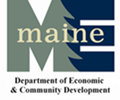|
|
|
The Daily
Edition for Tuesday, April 21, 2020 |
To view this Daily Impact online, click here. |
|
Welcome to
your Daily Impact newsletter! |
|
|
As a valued member of
the Maine State Chamber of Commerce, we plan to stay in touch with you every
afternoon, through emails like this one and on Facebook and Twitter, until the pandemic passes. We
intend to provide you with the latest state and federal information, as well
as highlighting the creativity and innovation that is occuring here in Maine
during this unpredictable and rapidly changing time. To assist you in
navigating the uncertainties ahead, we have created a diverse and
comprehensive collection of web-based resources to help you take care of yourself and your family, your employees, your business, and your community. |
|
|
Do you have a question? ASK THE EXPERTS. |
We are here to
help in any way we can! |
|
U.S. Senate approves
nearly $500 billion in additional rescue funds for small businesses,
hospitals and COVID-19 testing |
|
The U.S. Senate passed a $484
billion package in additional COVID-19 rescue funds today. President Donald
Trump has said he will sign the measure, which is pending a vote in the U.S.
House of Representatives expected this Thursday. The package will infuse $310
billion in the Paycheck
Protection Program (PPP), which ran out of initial funds last week.
Included in the $310 billion for PPP is $60 billion for Economic
Injury Disaster Loan (EIDL) program loans and grants. The nearly half a
trillion-dollar package also sets aside approximately $60 billion for smaller
community lenders prioritizing loans in underbanked and rural areas. In the first two weeks the PPP
program was available and before the $350 billion in initial PPP funds were
exhausted, approximately 1.6 million loans for small businesses across the
U.S. were approved. That includes nearly 17,000 small Maine employers that
were approved for more than $2.22 billion in PPP loans, according to Sen.
Susan Collins' office. Sen. Collins co-authored the
PPP, which provides small businesses and employers struggling due to the
Coronavirus pandemic loan amounts up to 250 percent of their monthly payroll
expenses. PPP loans are forgivable if at least 75% of the loan is spent on
payroll. The PPP is intended to help employers keep their employees paid and
employed at a time when a record number of people are filing for
unemployment. PPP applications are processed
through approved
lenders. Loans are administered through the U.S.
Small Business Administration. Employers that have not yet applied for a
PPP loan are advised to contact their lender right away to see how a PPP loan
can help and to start the application process. The package approved by the
U.S. Senate today also allocates $75 billion in further aid for hospitals and
$25 billion to expand COVID-19 testing. COVID-19 testing is a critical
component in plans and guidelines surrounding reopening economies across the
country. The $484 billion agreement
came together after congressional Democrats pushed to include more aid for
hospitals and more funds for COVID-19 testing in the $250 billion+ PPP
replenishment the White House and Republican lawmakers proposed. The Maine State Chamber will
continue to monitor actions in the U.S. Congress on this rescue package and
and will keep Maine's business community updated on important developments. |
|
Secretary Dunlap announces
order of bond questions on July ballot |
|
This afternoon, Secretary of
State Matthew Dunlap announced the order
of the two bond questions for the July 14, 2020 Special Referendum
election. Secretary Dunlap and Deputy Secretary of the Bureau of
Corporations, Elections and Commissions Julie Flynn determined the bond
question ballot order by random drawing today. The bond questions are: Question 1: Internet
Infrastructure Bond (PL 673, Sec. B-10) "Do you favor a
$15,000,000 bond issue to invest in high-speed internet infrastructure for
unserved and underserved areas, to be used to match up to $30,000,000 in
federal, private, local or other funds?" Question 2: Transportation
Bond (PL 673, Sec. A-9) Do you favor a $105,000,000
bond issue for improvement of highways and bridges statewide and for
multimodal facilities or equipment related to transit, freight and passenger
railroads, aviation, ports, harbors, marine transportation and active
transportation projects, to be used to match an estimated $275,000,000 in
federal and other funds? Voters will decide on the two
bond questions in the Special Referendum Election on Tuesday, July 14, 2020,
which will take place on the same day as the State Primary Election. Visit the Upcoming
Elections webpage for additional information. The Absentee
Ballot Request service for this election is live, allowing registered
voters to easily request their ballots via mail. Voters can also request
their ballot from their municipal clerk directly or vote in person on
Election Day. Maine citizens who need to register to vote can access the Maine
Voter Registration application on our website and submit their completed
form via mail to their town clerk. |
|
Maine fishermen among small
business owners hoping for new paycheck protection funds |
|
According to a recent WMTW
report, many
Maine fishermen were among those waiting in line when the $350 billion in
funding for the Paycheck Protection Program ran out. Congressional leaders
are working on an agreement to be voted on this week that would reload those
funds. "The Small Business Administration, which is not used to dealing with people who are self-employed, had them wait an extra week," Sen. Collins said. "And thus, by the time many of the fishermen or carpenters or plumbers or hair stylists in our state applied, the money was out." The Maine Coast Fishermen's
Association says many fishermen were uncertain if they even qualified without
other full-time employees. Others were slowed down if they used a personal
bank account for their operations, as the applications still went through the
private banking system. "You pay yourself, you
are part of that payroll," said Ben Martens, the association's executive
director. Hopeful for a new round of funding, he's reminding self-employed fishermen
and those who hire contracted crews that they would be able to take
advantage. Martens says the roll-out of
the program was confusing at times, made difficult by the sheer amount of
funding being distributed in a short period of time. "So, when there
were hiccups," Martens said, "unfortunately, a lot of those hiccups
were sent to the back of the line and that's where a lot of fishermen ended
up." One Maine community bank has
roughly 300 applications from those who are self-employed waiting to be
processed. A regional New England bank has 25,000 waiting to be processed. A separate $300 million was
allocated to fishing and aquaculture industries around the country in the
$2.2 trillion CARES Act. Fishing agencies in the Commerce Department have yet
to detail how those funds will be allocated. President Trump has strongly encouraged
Congress to add funds to the Paycheck Protection Program, something Secretary
Mnuchin expressed optimism about Sunday. If passed, the legislation could be
signed on Wednesday. |
|
Collins, Pingree Call on
USDA to Boost Support for Maine Farmers Facing Severe Economic Harm Due to
COVID-19 |
|
In a bipartisan effort to support Maine farmers during the ongoing pandemic, U.S. Senator Susan Collins and U.S. Congresswoman Chellie Pingree wrote to U.S. Department of Agriculture Secretary Sonny Perdue to reiterate priorities for implementing the assistance to farmers that Congress provided through the CARES Act and the Families First Coronavirus Response Act. Senator Collins and Congresswoman
Pingree emphasized the need for the Coronavirus Food Assistance Program
(CFAP) to provide assistance directly to growers as well as support local
producers and their supply chains. "The shutdown of the food service network - including restaurants, schools, and hospitality businesses - has caused enormous economic harm to Maine's small- and medium-sized farms, especially for dairy farmers and for growers of specialty crops such as potatoes, blueberries, and apples," Senator Collins and Congresswoman Pingree wrote. "Our farmers are essential and are the backbone of the economy of many rural communities. USDA must work quickly and collaboratively to ensure that small- and medium-sized farms are able to survive this unexpected downturn while helping to meet the food security needs of American families." In their letter, Senator
Collins and Congresswoman Pingree urged USDA to: * Provide targeted farmer
payments, which are essential for Maine's specialty crop growers who have
suffered acutely from recent international trade disputes and received almost
zero direct benefit from the Administration's multiple disbursements of
agricultural aid. * Implement the components of
CFAP focused on purchasing fresh fruits and vegetables, dairy products, and
meat products for redistribution to food banks, school nutrition programs,
and emergency feeding organizations, which will help alleviate food
insecurity for families and support local producers by reducing inventory and
stabilizing prices. * Collaborate with Maine's
invaluable anti-hunger organizations and distribution companies to implement
the CFAP, which could also have a positive impact on the currently slowed
food service distribution industry. * Allow broad flexibility on
the types of quantities of products deemed eligible for assistance under
the CFAP - such as whole milk, butter, cottage cheese, and yogurts - which might
not be permitted for USDA nutrition assistance programs under in normal
circumstances. Along with the entire Maine
Delegation, Senator Collins and Congresswoman Pingree have led efforts to
assist Maine farmers, including calling on USDA to support dairy farmers,
support potato farmers, support specialty crop growers, and support local
food producers and new farmers. On March 16, Pingree wrote
to Speaker Pelosi detailing the impact of COVID-19 on local and regional
markets and urging the Speaker to provide emergency disaster payments to
farmers selling fresh, local, and minimally processed foods in community
markets. On April 3, Pingree and 67 bipartisan members of Congress wrote
to USDA Secretary Sonny Perdue urging him to provide swift relief for
local food producers whose markets have been affected by the coronavirus
pandemic. Pingree is a member of the House Agriculture Committee and the
House Appropriations Subcommittee on Agriculture. |
|
To reserve your banner
ad in the Daily Impact,
please contact Melody Rousseau |
|
With Coronavirus Impacting
Processing Plants King, Colleagues Urge "Aggressive Action" to Protect Food
Supply, Essential Workers |
|
U.S. Senator Angus King and 35
of his colleagues urged Vice President Mike Pence and other members of the
Trump Administration to ensure the
safety of the nation's food supply and protect
essential workers in the food supply chain. The letter comes after
numerous reports of essential workers in meatpacking plants, processing
facilities, farms, grocery stores, and markets falling ill from COVID-19. In
their letter, the Senators urged the White House and federal agencies to
coordinate with state and local governments and the private sector to take
aggressive action to protect essential workers and the food supply from
further damage. The Senators also asked a series of questions about the
actions being taken and coordination with the food industry. "It is vital that we do everything we can to protect food supply workers," wrote the Senators. "Breakdowns in the food supply chain could have significant economic impacts for both consumers and agricultural producers. It is also imperative that precautions are taken to ensure the stability and safety of our food supply." "The severe shortages of adequate COVID-19 testing capability and personal protective equipment are exacerbating these problems," wrote the Senators. "Lack of access to tests and personal protective equipment leaves essential food supply workers at even higher risk and makes the virus more likely to spread, harming more workers and further damaging our food supply chain." Since the coronavirus crisis
began, Senator King has worked to make sure our nation's farmers are able to
withstand the economic and health pressures in order to continue feeding the
American people. In recent weeks, King has urged to the USDA to
support New England dairy farmers who are facing decreased prices and
increased costs, and Maine
potato farmers who are at risk of losing nearly half of their business
with restaurants and food service facilities closed across the country. He
has also joined bipartisan efforts urging
the Administration to offer direct financial relief during the crisis,
and to support growers of specialty crops; specialty crops, including
potatoes and blueberries, are key crops for Maine. |
|
Coronavirus, data
analytics the focus of UMaine online discussion April 25 |
|
The implications of the
coronavirus pandemic on artificial intelligence (AI) and data analytics will
be the focus of an online discussion on Saturday, April 25 at 11:00 a.m. The
Zoom meeting link is https://maine.zoom.us/j/98301058439.
No password is needed. In the presentation, "Business
In and After the Time of COVID-19 Pandemic and Enhanced Roles of AI &
Data Analytics," Yonggang "Tim" Lu, Harold Alfond Associate Professor of
Business Analytics at the University of Maine, will discuss the profound
current and future impacts of the COVID-19 pandemic on businesses, especially
local and small- to medium-sized businesses. Several critical questions will
be addressed, including what are good ways to recover a business from the
pandemic, and what are the necessary new skills and knowledge needed to
successfully develop a career in the post-coronavirus environment? "The COVID-19 pandemic has severely affected every aspect of our society," says Lu. "When we are fighting together to defeat this invisible enemy, everyone also needs to proactively prepare for the new normal in the business environment after the crisis." The growing importance of AI
technology and data analytics in the business world will also be discussed. "The rapid, global spread of
COVID-19 has brought advanced big data analytics tools front and center, with
entities from all sectors of health care, policy, and business seeking to
monitor and reduce the impact of this virus," says J. Michael Weber, dean of
the University of Maine Graduate School of Business. "The University of Maine Graduate and Professional Center and the Graduate School of Business are working with the business community to provide resources and expertise in AI and data analytics that are relevant today and tomorrow," Weber says. "Data analytics will provide the businesses of Maine with the data, tools, and decision metrics to develop scale-up strategies that will be critical for jump-starting their new business models and our economy." |
|
SERIES
SPONSORS: Bangor Savings Bank, Central
Maine Power Company Additional webinars will be forthcoming,
and sponsorship
opportunities are available.
Questions can be directed to Angela S. Arno, director of programs and events
for the Maine State Chamber of Commerce, by emailing [email protected] or
calling (207) 623-4568, ext. 104. |
|
|
Wednesday, April 22 | Starting at 11:00
a.m. THE INTERSECTION OF WORKERS'
COMP The
impact of the COVID-19 pandemic on employers, their employees, and our state
and national economies has been remarkable. Across the state, businesses
large and small are struggling with how to adjust to this new and
dramatically different paradigm. Like many other groups, the Maine State
Chamber has worked to bring our members and employers all around the state
the latest and most accurate information on changes to our unemployment
insurance system, paid sick leave, paid FMLA leave, the CARES Act, and the
accompanying Paycheck Protection Program and EIDL assistance. However,
forgotten up to this point is how another important aspect of the cost of
doing business may be impacted by the pandemic - workers' compensation
insurance. Like so many other business factors, there are a significant
number of unknowns surrounding workers' comp going forward, including the
compensability of COVID-19-related claims, claims that may arise while
employees are working remotely from their homes, and how a shrinking
statewide payroll may impact premium rates, and therefore, overall premium
costs. Sponsored by MEMIC, MaineHealth /
Synernet, Preti Flaherty, and United Insurance |
|
|
|
Wednesday, April 29 | Starting at 11:00
a.m. WEBINAR FOR SOLE PROPRIETOR BUSINESSES: This webinar will focus on the short- and
long-term issues arising from the pandemic for sole proprietors - with
suggested solutions. Topics covered will include a review of up-to-date
federal and state legislative opportunities, tax issues to discuss with your
accountant, insurance liability, health insurance options, credit protection,
and steps for sole proprietors to take with customers. There will also be a
brief review of pertinent estate planning options during the pandemic. Regiser here | Sponsored by Lambert Coffin |
|
|
Wed., May 6 | Starting at 11:00 a.m. WE ARE STILL FINALIZING THIS WEBINAR TOPIC TO BE ANNOUNCED |
|
|
Wednesday, May 13 | Starting at 11:00 a.m. RECENT STATE AND FEDERAL TAX CHANGES This webinar will focus on federal tax
changes contained in the CARES Act and changes made at the state level that
provide support for businesses during this pandemic. Additional topics also
include a look at the ever-changing landscape at the federal level for
additional stimulus funds and what those changes might look like. Register here | Sponsored by Pierce Atwood and WIPFLi,
LLP |
|
NAVIGATING THE LEGAL AND
FINANCIAL ISSUES Presented
on Wednesday, April 15 | Listen to the recording here The Maine State Chamber hanks our April 15
webinar presenters and sponsors: Rudman & Winchell; TD Bank; and, Albin,
Randall and Bennett. |
|
|
Tuesday, April
28 | Legislative Strictly Social Virtual Coffee Hour |
||
|
The
Maine State Chamber of Commerce and the Kennebec Valley Chamber of Commerce
invite you to attend our Legislative Strictly Social
Virtual Coffee Hour. We
invite you to grab a cup of coffee at 9:00
a.m. on Tuesday, April 28, and hear from legislators about current
issues. Normally,
our annual series of statewide receptions is an ideal way for you, the Maine
business leader, to interact with business associates, new and prospective
Maine State Chamber members, and state representatives in a relaxed setting.
This year, due to the COVID-19 situation, we will be hosting this event online as a coffee hour with Sen.
Eloise Vitelli, Sen. Jeff Timberlake, Rep. Ryan Fecteau, and, Rep. Trey
Stewart. Our panel of legislators will open the hour, and there will be
an opportunity for questions through the Zoom chat feature. Please join us
for this presentation. A participation link will be sent to you after you
have completed registration. Learn more or register here. |
|
|
|
Thank You To Our Generous Sponsors! A special thank you to our sponsors from the Legislative Strictly
Social, which has now become the Legislative Strictly Social Coffee Hour, due
to the need for social distancing during this pandemic. Your continued
support is greatly appreciated! |
||
|
SERIES SPONSORS: Casella
Waste Systems, Inc.; Central Maine Power Company; |
||
|
PREMIER SPONSOR: AT&T |
SPOTLIGHT SPONSORS: Backyard Farms, LLC; Brookfield Renewable Energy |
|
|
PRESENTING SPONSORS: Altria
Client Services LLC; American Chemistry Council; Bank of America; Dead River
Company; Emera Maine; Finance Authority of Maine; Hannaford Supermarkets;
MaineHealth; Merrill's Investigations & Security; Mitchell Tardy Jackson
Government Affairs; PhRMA; Preti Flaherty, LLP; Spectrum Healthcare Partners;
The Sheridan Corporation; Unitil Corp. |
OFFICIAL SPONSORS: Bangor
Savings Bank; Charter Communications; Cross Insurance; E.A. Scribner
Insurance Agency, Inc.; Elanco; Enterprise Holdings; IDEXX Laboratories, Inc.;
Maine Better Transportation Association; MEMIC; Maine Primary Care
Association |
|
|
Sponsorship opportunities are still available for this event. Questions can be directed to Angela S. Arno, director of
programs and events for the Maine State Chamber of Commerce, |
||
|
42 Maine nonprofits
awarded $100K in Machias Savings grants |
|
According to yesterday's
Mainebiz, The Locker Project, a nonprofit working to get healthy food to
children and families in greater Portland during the pandemic, will receive a
helping hand from Machias Savings Bank in the form of a $2,500 grant. The
group is one of 42 Maine nonprofits that will benefit from the bank's Rapid
Response Grant program, which awarded a total of $100,000 last week. Out of more than 100 groups
that had applied for funding, 42
will receive grants ranging from $1,000 to $5,000 each to cope with the
ongoing public crisis. Beneficiaries from around the state center largely
around managing food insecurity, services for the aging and isolated,
community action programs and emergency response teams. "Our goal with this
program was to be able to provide quick support for organizations that are
lifting up their communities at this time," said Melissa Denbow, vice
president of corporate giving and community relations at Machias Savings, in
a news release. "We are proud to say that, within two weeks of launching the
program, much of the funding we were able to provide is already making a
difference in communities across the state," she added. Kathryn Sargent, the Locker
Project's executive director, told Mainebiz the group will use its $2,500
grant to cover increased staff time and food costs during the crisis. Unable
to draw on its 100 volunteers at this time, the group is currently operating
with a staff of four and one board member who continues to volunteer. Every
weekday, they pack and distribute 100 bright green bags of food in Portland,
South Portland and Westbrook, along with boxes of staple items from Good
Shepherd Food Bank. "When the schools closed,
we wanted to make sure we could continue to provide healthy food to children
and families in Greater Portland," Sargent explained in an email.
"We quickly pivoted from stocking school pantries and hosting fresh food
events to offering pre-packed bags of staples and fresh produce at school
meals sites and through other partners." She also gave a shout-out to
donors and funding providers such as Machias Savings Bank she said have been
"incredibly supportive." Machias Savings Bank also support
nonprofits beyond those that are working directly with the pandemic through
its Branch
Support Funds. |
|
Maine veterinary lab's
subsidiary to make coronavirus tests for humans |
|
According to yesterday's Bangor
Daily News, a subsidiary of Westbrook-based IDEXX Laboratories is in the early
stages of producing a coronavirus test for humans. The company announced
the development Monday morning as it also moves to market another test for
pets. IDEXX said that its
subsidiary, Georgia-based Opti Medical Systems, has validated a polymerase
chain reaction test for humans, which will initially be available on a
limited basis to its existing customers already engaged in coronavirus
testing. PCR is a method that rapidly makes thousands of copies of a DNA
sample. Starting this week, IDEXX is
making available a coronavirus test for pets after growing demand for them.
They will initially be available in North America and then become available
across the globe in the coming weeks, according to the company. So far, there's no evidence to
suggest cats and dogs can pass the coronavirus onto humans, according to the
World Health Organization, but reports in recent weeks have linked infected
pets with owners who have tested positive. Such cases, though, have been very
rare. There have been at least four reports of pets testing positive for the
coronavirus: a cat in Belgium in late March, another cat in Hong Kong in late
March, a German shepherd in Hong Kong in mid-March, and a Pomeranian in Hong
Kong in February. "We have continued to monitor the rapidly evolving public health crisis worldwide, paying special attention to the effects on pets," said Jay Mazelsky, president and CEO of IDEXX. "While there is currently no evidence that dogs or cats play a role in transmitting the disease to humans, it became clear offering the test was the right thing to do when we saw clinical evidence that pets - especially cats and ferrets - can in rare cases be at risk for infection. And, we heard from our customers around the globe that veterinarians needed a testing option." Since mid-February, IDEXX has
tested specimens from more than 5,000 animals from 17 countries for the
coronavirus, and none came back positive, according to the company. "This
suggests dogs and cats living with infected people generally remain
uninfected, except in rare and isolated cases," the company said. The test
for pets is recommended only for those animals living with a human who has
tested positive, showing signs of coronavirus symptoms and have been tested
for other common infections, which a veterinarian has ruled out. IDEXX
recommends against testing asymptomatic pets. |
|
Maine Community Foundation
awards $4M in grants to nonprofits |
|
The Maine Community Foundation
has awarded
$4 million to support nonprofit organizations across the state. Donors
with funds at the foundation stepped up with $2 million in grants to provide
support for many of the Maine nonprofit organizations that are responding to
the COVID-19 crisis. The grants help address food
insecurity, poverty, health, and the needs of homeless populations, Maine
tribes and immigrants. Grants also support economic relief for specific work
sectors, according to a news release Andrea Nemitz, communications director
of the foundation. Grants totaling an additional
$500,000 were deployed from MaineCF's new Emergency Response Fund (COVID-19
Fund), which assists community-based organizations confronting the viral
outbreak and its consequences, and another MaineCF fund that focuses on food
security. The state has included the foundation on its COVID-19 Maine Helps
list of places to donate. Grant funds totaling $1.5
million also were awarded through the foundation's community-building
program, its largest, and the People of Color Fund. MaineCF distributed the
funds early to more quickly support nonprofit organizations significantly
impacted by the pandemic. Grant recipients will have
flexibility this year to use their grant funds for general operating support.
This funding for nonprofits is even more important now as nonprofits face
additional demands for their services and limited opportunities to raise
money through traditional outreach events. The foundation connects donors
with resources to nonprofit organizations across the state and has worked
since 1983 to improve the quality of life for all Maine people. For more
information, visit mainecf.org. |
|
|
|||
|
To join these advertisers in
the Daily
Impact, please contact Melody Rousseau |
|||
|
TO
UNSUBSCRIBE, CLICK HERE. |
NOTICE: In an ongoing effort to thwart
the activities of online hackers, the Maine State Chamber |












